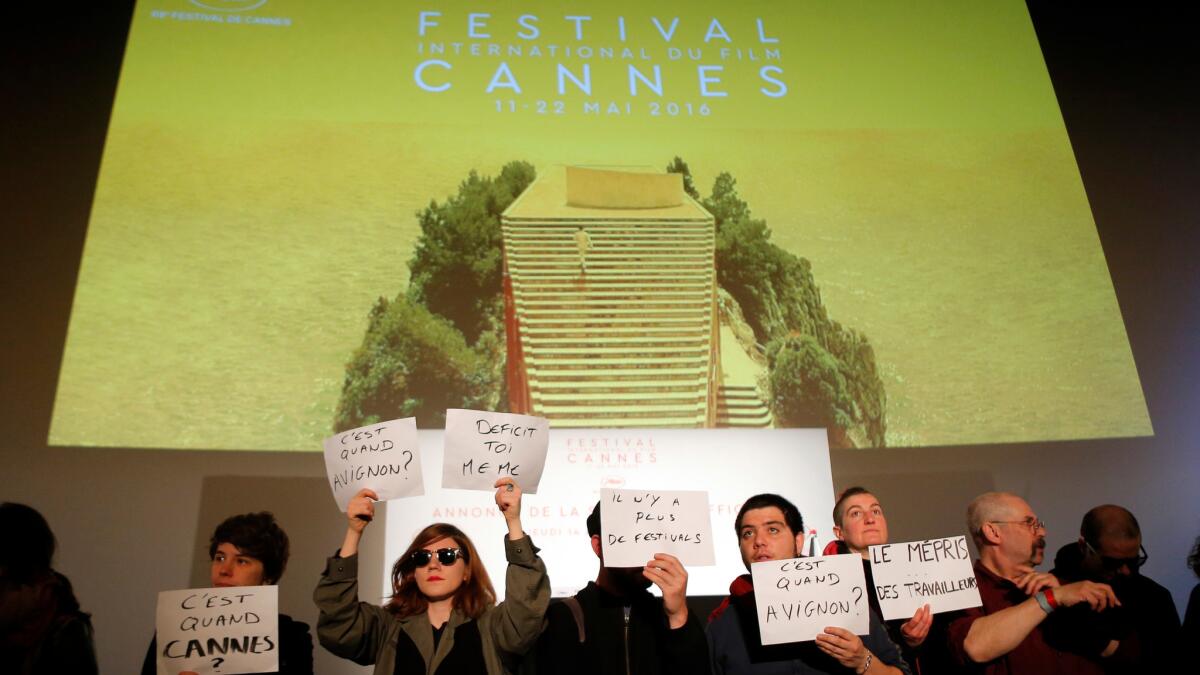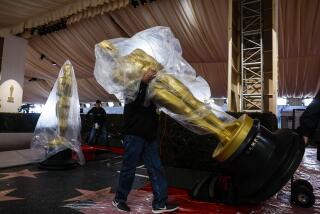Op-Ed: What Cannes and the labor protests in France have in common

France is in the midst of two national rituals: the celebrated film festival in sunny Cannes and massive street protests against proposed labor law reforms in slate-skied Paris. Other than feeling distinctly French — this is a culture that loves its cinema and loves its demonstrations — these two events may seem unrelated. But they unspool from the same historical sources, and they measure the distance France has — and hasn’t — evolved.
The Cannes Film Festival was the invention of Jean Zay. Between 1936 and 1939, this 30-something idealist, committed to the values of French republicanism, served in Léon Blum’s Popular Front, as minister of national education and fine arts. When Leni Riefenstahl’s film “Olympia,” a grim paean to Nazi buffness, won the top prize at the Venice film festival La Mostra in 1938, Zay was outraged. His outrage only grew upon learning that Mussolini and Hitler had fixed the vote, and he decided to draw up plans for a counter festival.
Working with American film studios, Zay issued invitations to the world’s leading filmmakers and actors to participate in the event. What better way, he thought, to defy the lengthening shadow of totalitarianism? His festival, like the Paris Exposition of 1889, would reflect the abiding legacy of 1789. No need, this time, for an Eiffel Tower. The revolutionary trinity of liberty, equality and fraternity would be broadcast to the world from La Croisette, Cannes’ seaside promenade.
But on the same day the festival was to open, Germany invaded Poland. The festival was cancelled and Zay quit his ministerial post to enlist in the army. Following France’s defeat, Zay was arrested and imprisoned by the collaborationist Vichy regime; four years later, as the Allies were landing in Normandy, Vichy’s fascist thugs killed him.
In the wake of France’s liberation, with much of France in ruins, the unions — especially the largest and most militant one, the General Confederation of Labor —played a key role in the resurrection of the festival. In 1946, union workers volunteered to build the festival’s grand hall, the Palais de la Croisette — a gesture welcomed by the money-strapped organizers. This act of national solidarity was recognized at last year’s festival, when the C.G.T’s current leader, Philippe Martinez was the guest of honor.
France has adapted to and accepted global commercialism — the very force ... spurring workers in Paris to march under banners as red as the carpets in Cannes.
Yet Martinez was sorely out of place: 70 years after its rebirth, Cannes has grown into a glam affair focused on multimillion-dollar deals, not Republican ideals. Critics note that the large studios, which haul to Cannes blockbusters such as “The Da Vinci Code” and “Star Wars,” increasingly control a festival that once helped obscure filmmakers and unknown auteurs win notice. Rather than serving as midwife to rising talents, Cannes now mostly plays butler to established names; Cannes no longer makes stars, but rather it is stars who make Cannes.
At Cannes, to put it simply, France has adapted to and accepted global commercialism — the very force weighing on traditional industries and spurring workers in Paris to march under banners as red as the carpets in Cannes. Those workers don’t want change; they want to maintain the rights their ancestors fought hard to win.
Like Cannes, these protests have their roots in the history of the Popular Front, the uneasy alliance of Socialists, Communists and Radicals voted into office 80 years ago this month. This win at the ballot box was accompanied by vast labor strikes that brought all of France to a halt. Following frantic negotiations, the unions won a historic victory, including a 40-hour workweek, paid vacation and collective bargaining. Today, workers believe the Socialist government they voted into office five years ago now threatens to reverse those gains. Desperate to improve the country’s crippling unemployment rate — 10% and counting — the flailing government proposed legislation to make it slightly easier for employers to hire and fire, as well as lengthen the workweek from the current 35 hours. This did not sit well with workers or students. Carrying signs declaring “Yes to work, No to slavery,” the protesters grabbed the media spotlight from the star-studded galas to the south.
What would Zay — who worked as tirelessly for the democratization of leisure as he did for the democratization of culture — make of events in Paris and Cannes? Would he be shocked at Cannes’ transmogrification into a high-flying high-security zone? Would he be pleased or worried by the demonstrations in Paris, where the workers’ fidelity to a heroic past offers little guidance for an uncertain future?
It is, of course, impossible to say. But to misquote a line from “The Wizard of Oz,” a movie scheduled for the 1939 festival that never was, we’re not in Zay’s France anymore, even if the workers wish they were.
Robert Zaretsky teaches in the Honors College at the University of Houston. His latest book is “Boswell’s Enlightenment.”
Follow the Opinion section on Twitter @latimesopinion and Facebook
More to Read
A cure for the common opinion
Get thought-provoking perspectives with our weekly newsletter.
You may occasionally receive promotional content from the Los Angeles Times.






